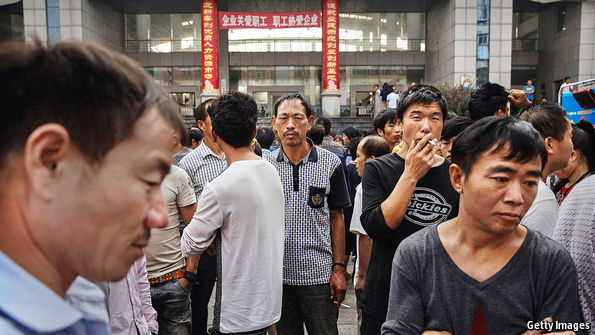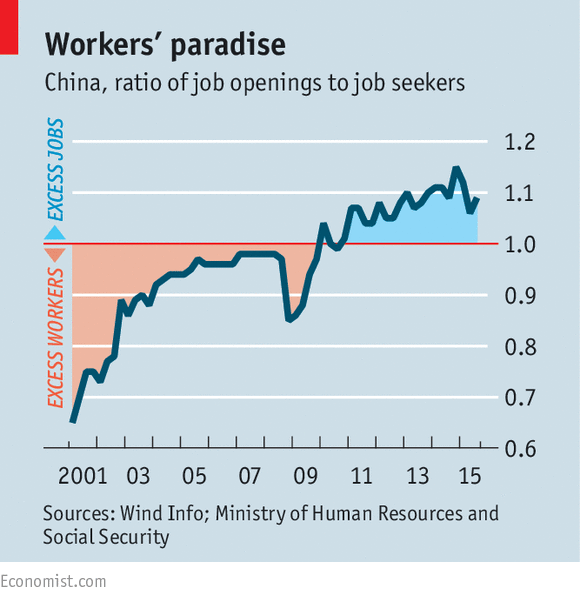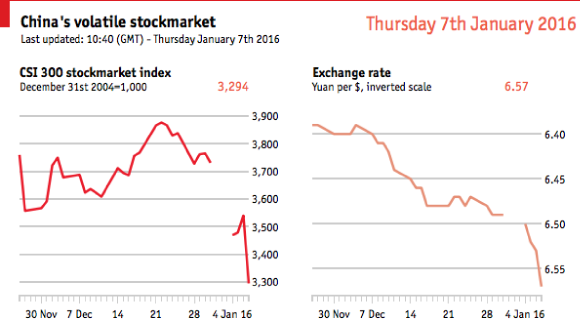China’s labour market
Shocks and absorbers
Unemployment is rising, but is not always visible
.

THE crane that looms over Sainty Marine’s shipyard on the lower reaches of the Yangzi river had been motionless for weeks when a worker climbed it late last year. The struggling company had stopped getting orders and, rather than deal with the headache of laying off its employees, it simply stopped paying them. The man on the crane threatened to jump to get the attention of local officials, coming down only when they promised to help him. Other workers took a somewhat safer, though (in a country where strikes are illegal) no less provocative measure to demand their missing wages: they marched out and blockaded a nearby highway.
That Sainty Marine workers have resorted to such actions is perhaps not surprising. The global shipping industry is depressed, plagued by oversupply at a time when slowing trade means demand for new ships is shrinking. Chinese firms that rushed to expand are now gasping.
Sainty Marine, which overextended itself by buying another shipbuilder, is veering towards bankruptcy. Withholding wages is a common tactic for Chinese companies in trouble; in Yizheng, the gritty town that is home to Sainty Marine’s shipyard, the local government has published statements admonishing employers for doing so.
Many workers at other hard-hit companies, especially in heavy industry, are facing similar frustrations. The China Labour Bulletin, a watchdog group based in Hong Kong, recorded 2,774 strikes and worker protests nationwide in 2015, double the 1,379 posted in 2014. Police arrested four labour activists last week in the southern province of Guangdong, China’s manufacturing heartland—a sign of the authorities’ unease over the growing protests.
Although the swooning stockmarket and falling currency have captured global attention in recent days, the effect of slowing growth on employment is a more sensitive problem for the government.
The Communist Party has always treated markets and, by extension, investors with a certain disregard. Workers are different: the steady improvement in their living standards over the past three decades has helped to legitimise the party’s rule.
How worried should it be? The stresses have made only a small dent so far in overall employment figures, at least in the official telling. The jobless rate crept up to 5.2% at the end of September from 5.1% at the start of last year, according to the latest government survey of 31 big cities.
Manufacturing firms are clearly cutting jobs: the employment index in the closely watched Caixin survey of the sector dipped to 47.3 in December—its 26th consecutive month below 50, the threshold marking a contraction. But for services, a bigger share of the economy than manufacturing, Caixin’s employment index hit 51.3 in December, above last year’s low of 50.1 in August. That points to an expansion.
However, the employment data are flattered by two uniquely Chinese shock-absorbers. First, the hukou system of household registration means that some 270m migrant workers who have gone to cities for jobs do not enjoy a permanent right to live in them, let alone collect unemployment insurance there. When they lose their jobs, they are expected to return to their original homes, often in the countryside, and do not count as unemployed. In 2008, at the height of the global financial crisis, tens of millions of migrants simply went back to rural areas, tilling fields or scrabbling for meagre pay in villages. There has been no similar exodus this time, but the countryside remains a safety valve that can help to absorb the unemployed.
.
The other buffer is one of the things hobbling the economy in the first place: state-owned enterprises (SOEs). Private firms are better run and more profitable, but SOEs, with their political backing, have far easier access to finance and dominate a series of restricted sectors, from energy to transport. These privileges carry with them political duties, including an obligation to help maintain social stability by refraining from laying off workers. With the army planning to cut some 300,000 positions as part of a modernisation plan, the government reminded SOEs last month that they are required to reserve 5% of vacancies for demobilised soldiers.
In a working paper last year, analysts at the International Monetary Fund noted signs of “increased labour hoarding in overcapacity sectors”, helping to suppress unemployment at the cost of weaker productivity. But even SOEs do not have infinite resources. Loss-making companies with little prospect of turning round their performance are starting to shed workers.
Longmay Mining, the largest SOE in the northern province of Heilongjiang, said in September that it would cut up to 100,000 jobs, nearly half its workforce.
China’s economy should, in theory, be able to accommodate many of the unemployed. The working-age population peaked in 2012, so all else being equal, there is less competition for jobs. At the same time, the economy’s tilt towards the services sector, which is more labour-intensive than industry, generates jobs even as growth slows. Services probably accounted for more than half of China’s GDP last year for the first time in decades, and their share is growing: in nominal terms, service output grew by 11.6% year-on-year in the first nine months of 2015, whereas manufacturing grew by just 1.2%.
.

The central bank estimates that as long as the service sector’s share of GDP increased by one percentage point in 2015 (in fact, it did better), the economy could have slowed by nearly half a percentage point and yet still generated the same number of new jobs as it did in 2014. This helps to explain why employment centres around the country still report a shortage of workers: an average of 1.09 vacancies for every applicant (see chart). For those hoping to be hired by accounting firms or restaurants, opportunities are plentiful.
The problem for shipbuilders and coalminers is that many of the service jobs are destined for younger people with more education, and the jobs they can get, whether as janitors or cooks, often pay less well than their current work. The government has promised to provide retraining for those who lose jobs in industry, but that can only help so much. “Most of these guys can’t just go from making a living by their brawn to making a living by their brains,” says a recruiter at the human-resources centre in Yizheng.
For the employees of Sainty Marine, the question of what their next job might be is not the most pressing one. They have been showing up to work without getting paid. Mr Wang, 45, a welder, has a note signed by a manager stating that he is owed several months’ salary, money that he needs to pay back relatives who lent him cash to build a house. He joined the group blocking the highway, but that achieved nothing. He has tried to corner his bosses, but that also got him nowhere. Lately, he says, he has been looking at the crane, sizing it up for a climb.

0 comments:
Publicar un comentario